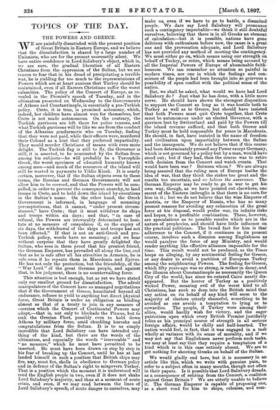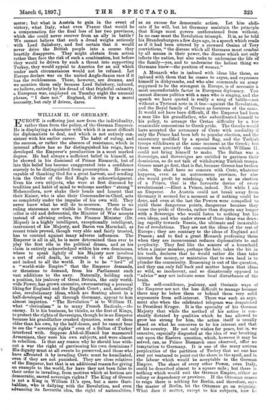TOPICS OF THE DAY.
THE POWERS AND GREECE.
WE are painfully dissatisfied with the present position of Great Britain in Eastern Europe, and we believe that the dissatisfaction is shared by a large number of Unionists, who are for the present necessarily silent. We have entire confidence in Lord Salisbury's object, which is, we are sure, the gradual liberation of all Eastern Christians from the oppression of the Sultan, but we see reason to fear that in his dread of precipitating a terrible war, he is yielding far too much to the representations of Powers which are at heart anxious that Turkey should be maintained, even if all Eastern Christians suffer the worst calamities. The policy of the Concert of Europe, as re- vealed in the Premier's speech of Tuesday, and in the ultimatum presented on Wednesday to the Governments of Athens and Constantinople, is essentially a pro-Turkish policy. Crete, it is true, is promised autonomy, which, indeed, her children have almost won for themselves, but Crete is not made autonomous. On the contrary, the Turkish garrisons are left there for police reasons, and what Turkish garrisons will be like we see from the conduct of the Albanian gendarmerie who on Tuesday, finding that they were not paid, while their officers were, murdered their Colonel as a hint that they preferred impartiality. They would murder Christians of means with even more delight. The Turkish flag is still to fly, the Governor is still, it is asserted, to be nominated by the Sultan from among bis subjects—he will probably be a Turcophile Greek, the worst specimen of educated humanity known among men—and much of the resources of the island will still be wasted in payments to Yildiz Kiosk. It is nearly certain, moreover, that if the Sultan objects even to these terms, the Russian and German Governments will not allow him to be coerced, and that the Powers will be com- pelled, in order to prevent the consequent anarchy, to land troops in Crete, and to hold down the island by executions in the Sultan's name. On the other hand, the Greek Government is informed, in language of menacing peremptoriness, that it cannot, "under present circum- stances," have Crete ; that it must withdraw its ships and troops within six days ; and that, " in case of refusal, the Powers are irrevocably determined to hesi- tate at no measure of compulsion if, on the expiry of six days, the withdrawal of the ships and troops has not been effected." If that is not an anti-Greek and pro- Turkish policy, words have no meaning ; and we hear without surprise that they have greatly delighted the Sultan, who sees in them proof that his greatest friend, the German Emperor, has prevailed all along the line, and that as he is safe after all his atrocities in Armenia, he is safe even if he repeats them in Macedonia and Epirus. He has not only the protection, but the friendship, of the " War Lord " of the great German people, and against that, in his judgment, there is no countervailing force.
This situation is bad. enough, but as yet we have stated only our smallest ground for dissatisfaction. The adroit manipulators of the Concert have so managed negotiations that if the Government of Greece, humiliated beyond all endurance, refuses to yield to anything but direct physical force, Great Britain is under an obligation as binding almost as that of a treaty to join in any measure of coercion which the Concert of Continental Powers may adopt,—that is, not only to blockade the Piraeus, but to sink the Grecian Fleet, possibly even to hold down Athens by military force, amid chuckling hurrahs and congratulations from the Sultan. It is to us simply incredible that Lord Salisbury can have intended any- thing of the kind, but there are the words of the ultimatum, and especially the words " irrevocable " and " no measure," which he must have permitted to be inserted. He must have been drawn on step by step in his fear of breaking up the Concert, until he has at last landed himself in such a position that British ships may fire, nay, must fire, shells in obedience to German policy and in defence of the Sultan's right to misgovern Turkey. That is a position which the moment it is understood will rend the English people in two, even if it does not shake Lord Salisbury's majority, and thus at a moment of acute crisis, and even, if we may read between the lines of Lord Salisbury's speech, of acute danger to ourselves, may make us, even if we have to go to battle, a disunited people. We dare say Lord Salisbury will pronounce such a contingency improbable—we think it still doubtful ourselves, believing that there is in all Greeks an element of calculation—but it is possible, nations have gone delirious with enthusiasm before now, the cause is a great one and the provocation adequate, and Lord Salisbury has not provided any method of meeting the contingency.. We must either go on, which means using our strength on behalf of Turkey, or retire, which means being accused by all the Imperial Powers of Europe of abominable faith- lessness. We can remember no situation so painful in modern times, nor one in which the feelings and con- science of the people had been brought into so grievous a possibility of open conflict with the political sense of the nation.
But, we shall be asked, what would we have had Lord Salisbury do ? Just what he has done, with a little more nerve. He should have shown the strongest disposition to support the Concert so long as it was hostile both to Turkey as well as to Greece, but should have insisted. that both Powers must quit Crete together, that Crete must be autonomous under an elected Governor, with a garrison lent by Switzerland and paid by the Powers till the island revenue sufficed, and that both Greece and Turkey must be held responsible for peace in Macedonia. He should, in fact, have insisted in the name of freedom and civilisation upon impartiality between the Sultan and the insurgents. We do not believe that if this course- had been determinately pressed any Power except Germany, which is not governed by a policy but by a man, would have stood out ; but if they had, then the course was to retire with decision from the Concert and watch events. That would have been war ? Between whom ? We are always being assured that the ruling men of Europe loathe the idea of war, that they think the stakes too great and the results too uncertain, and we believe the assurance. The German Emperor may be ready to go to war to get his own way, though, as we have pointed out elsewhere, one secret of the Eastern imbroglio is that there is no corn for him in it ; but we do not believe that the wise Emperor of Austria, or the Emperor of Russia, who has so many present reasons for avoiding any exhaustion of the great force at his disposal, would prefer war, its infinite risks and hopes, to a profitable combination. These, however, are speculations as to possible results which are in the nature of prophecies, and should hive little influence on the practical politician. The broad fact for him is that adherence to the Concert, if it continues in its present course, involves such a disunion among Englishmen as would paralyse the force of any Ministry, and would render anything like effective alliances impossible for the time. This result would not be produced, as the Times keeps on alleging, by any sentimental feeling for Greece, or any desire to avoid a partition of European Turkey among the neighbouring Powers. The feeling for Greece, which fifty years ago was so strong, is rather in decay, and the illusion about Constantinople as necessarily the Queen City of the world, has since we entered Cairo nearly dis- appeared. But the horror of Turkey as a positively wicked Power, meaning evil of the worst kind to all Christians, has sunk so deep into the British mind that any action on its behalf of any kind will seem to the majority of electors utterly shameful, something to be avoided as one avoids a temptation to lying or to cowardice. The people, if Turkey were among their allies, would hardly wish for victory, and the eager- patriotism upon which every British Premier justifiably relies as his principal source of strength in all serious foreign affairs, would be chilly and half-hearted. The nation would feel, in fact, that it was engaged in a task wholly at variance with its sense of morality, and if we may not say that Englishmen never perform such tasks, we may at least say that they require a temptation of a kind which is in this case entirely absent. We are to get nothing for shooting Greeks on behalf of the Sultan.
We would gladly end here, but it is necessary in an article like this, which we write with genuine pain, to refer to a subject often in many mouths, though not often in their papers. Is it possible that Lord. Salisbury dreads, as a consequence of retiring from the Concert, a coalition against Great Britain ? We are utterly unable to believe it. The German Emperor is capable of proposing one, as a short road for him to ships, colonies, and com- merce; but what is Austria to gain in the event of victory, what Italy, what even France that would be a compensation for the final loss of her two provinces, which she could never recover from an ally in battle ? We cannot believe that such a dread weighs seriously with Lord Salisbury, and feel certain that it would never drive the British people into a course they heartily disapprove. They might abstain from action rather than face the risk of such a combination, but before they would be driven by such a threat into supporting Turkey, they would appeal to America for an aid which under such circumstances would not be refused. Let Europe declare war on the united Anglo-Saxon race if it has the recklessness. These, however, are dreams, and we mention them only because Lord Salisbury, induced, we believe, entirely by his dread of that frightful calamity, a European war, employed on Tuesday night the unusual phrase, " I dare not." England, if driven by a moral necessity, but only if driven, dares.







































 Previous page
Previous page